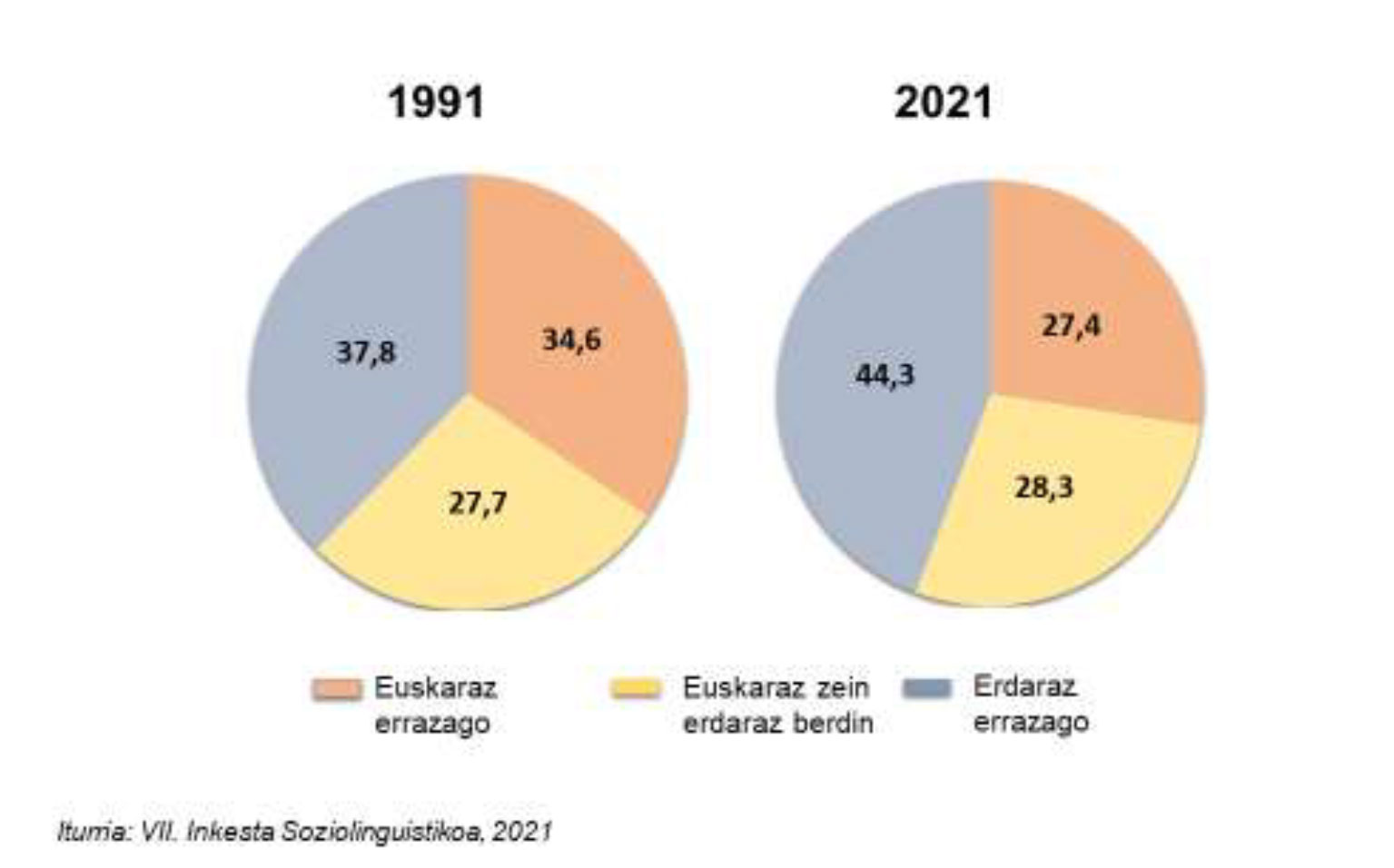27% of Euskaldunes are better off in Basque than in Spanish
- VII Basque Government in Araba, Bizkaia and Gipuzkoa. It presents the Sociolinguistic Survey. There are 261,000 Euskaldunes more than 30 years ago, but it falls from 34.6% to 27.4% who make it easier than in Spanish. Knowledge has increased considerably among young people, from 25% to 75%.

In the last five years the number of Euskaldunes has increased by almost 50,000 in Araba, Bizkaia and Gipuzkoa. In 2016 they were 631,384 and in 2021 680,629, according to the Basque Government Socio-Linguistic Survey every five years. Monday shows VII. The Socio-linguistic Survey, and the Minister of Culture, Bingen Zupiria, stressed that the Basque language is “a young language”, as the number of Euskaldunes has increased considerably between 16 and 24 years. Currently, Basques account for 74.5% of this age group, and in 1991 – the first year of survey – 25%. The survey was conducted among the CAPV population over 16 years of age, with a total of 261,000 Basques over 30 years.
54.8% of the population over 16 understands Euskera, of which 36.2% is able to speak. However, 44% of the latter are easier to speak in Spanish. In the last 30 years the number of Euskaldunes that make it easier than in Spanish has decreased: in 1991 34.6% of Euskaldunes made it easier in Basque and in 2021 27.4%.

By territory, the difference is large: 58.9% of the Euskaldunes of Álava make it easier in Spanish and 8.5% in Basque, while the remaining 24.9% make it easier for both. Among the Vizcaynos, 53.5% is easier in Spanish and 19.8% in Basque, while the remaining 26.7% is easier. In Gipuzkoa, on the contrary, 30.7% of the Basques speak more easily in Spanish and 38.7% in Basque, while the remaining 30.6% speak in both languages.
According to the report of the Department of Culture and Linguistic Policy of the Basque Government, it is the result of the increase in Euskaldunes: “As we have won the Basques, the number of Euskaldunes has increased more easily to speak in Spanish”. Knowledge of the Basque country has increased in three territories since 1991. In Gipuzkoa it has increased by eight points, almost doubling in Bizkaia and tripling in Álava. Regarding the use, 22% use Euskera as much or more than Castilian in the CAPV; 40.8% in Gipuzkoa, 14.5% in Bizkaia and 7.8% in Álava.
Environment limits use
Ease of speaking not only affects their use, but also their geographical and socio-linguistic environment. The survey reveals that “the network of contacts with Basques is very limited”. In fact, 55.4% of Basques live in what they call “erdaldun areas”, in towns and cities where the Basque population is less than half. The report clarifies that network assurance and verbal fluency are the two main factors for increased use.
Positive attitude towards Euskera
67% of the respondents showed a favorable attitude towards promoting the use of Euskera, 12 points more than 30 years ago. Some questions have been asked to measure the favourable attitude. For example, 74.7% said that to access the administration one should know Euskera, 89.3% said that all children should learn Euskera and 49.3% believed that radio and television stations should give more programs in Euskera.
There are no breathing spaces without proper speakers. Native speakers are the support, the oraceration, the mainstay and the foundation of the respiratory zones.
But let's start at the beginning: what are the respiratory zones? The word Arnasa is a word translated into Basque... [+]
Kaleko 71.000 elkarrizketa eta 227.900 solaskide behatu dituzte UEMAko herrietan, eta 2017koa baino ikerketa are sendoagoa burutu dute. Erabilera orokorra ez da ia aldatu: bostetik hiru aritzen dira euskaraz. Adina eta generoaren arabera badira desberdintasun batzuk.




















